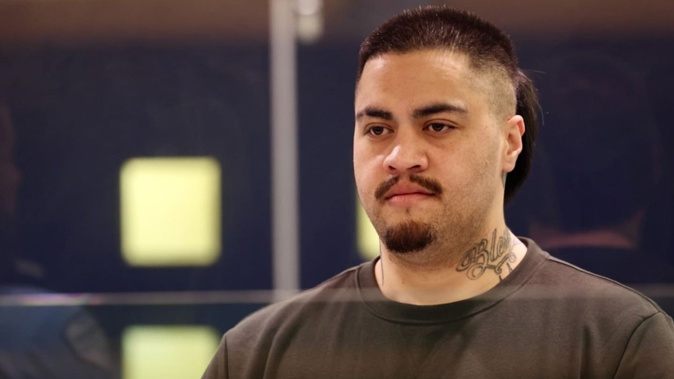
An Auckland man convicted of killing his baby son while his partner was out doing the laundry will spend at least 17 years in prison.
Following a week-long trial in the Auckland High Court in May, a jury took under three hours to find Tipene Te Ahuru, 33, guilty of murdering his baby son Amaziah.
Amaziah’s mother Raurangi Richards was praised by Justice Jane Anderson at Te Ahuru’s sentencing on Wednesday for what the Judge said was her moving and eloquent victim impact statement.
Richards expressed no anger towards Te Ahuru and said she wanted him to receive rehabilitation and support.
Amaziah, who was 3 months old, suffered extensive injuries at the couple’s cramped unit in Reagan Rd, Manukau during a brief period while his mum, Te Ahuru’s then-partner Richards, was out doing the laundry on September 18, 2022.
He died after 11 days on life support as Te Ahuru gave incomplete and conflicting accounts of what happened.
As she read her victim impact statement in court a couple of metres away from Te Ahuru in the dock, Richards expressed no anger towards him.
“I don’t think Tipene needs judgment or punishment from anyone else because I know he hates himself enough for the whole world at this point,” she said.
He had recently lost his mother and now had no contact with the two children he was helping Richards raise, she said.
Richards, who sat through the trial and was the key witness, was described by Crown prosecutor Luke Radich as showing a “remarkable and admirable lack of anger”.
She went as far as to thank all those involved in the court process, even Te Ahuru’s defence team.
Richards, now 24, described the fraught lead-up to Amaziah’s death as the young couple struggled to raise their boy and her two other children under five.
“No matter how hard we tried life would just find obstacle after obstacle,” she said.
They had got together after meeting on Facebook and ended up moving in together quickly due to the Covid lockdown, with Te Ahuru finding himself in the role of father to her two children before their son Amaziah arrived.
“I lived with, loved and supported Tipene for almost two years,” she said.
“Together we did our best to raise our little family.”
Lockdown and the inability to leave their home for anything but a brief outing caused immense stress, Richards said.
They had also been evicted from a home in Manurewa before finding themselves in emergency housing surrounded by uncaring neighbours.
“There were parties, fights and domestics almost every single night,” Richards said.
“We felt mentally and physically like we were at rock bottom.
“But this was only the beginning.”
They eventually found the small two-bedroom flat in Manurewa but the stresses remained, compounded by Amaziah’s ill health.
Richards said that after Amaziah’s death she had hit rock bottom and thought the only way to go forward was to keep the pain she felt fresh.
“Everything I knew and everything I believed in was lost.”
But the family had now moved back home to Coromandel where things were looking up. They had the support of whānau, Richards told the court. Other family members told the court they also harboured no hate towards him.
Expert medical witnesses at the trial said Amaziah’s head injury was in all likelihood the result of abuse.
The prosecution case was that Te Ahuru forcibly struck his son or smashed him into another object because the head injury was too severe to have been caused by a fall alone.
Paediatrician Dr Patrick Kelly said there was “no other reasonable possibility” than Amaziah’s injuries being the result of abusive head trauma.
The defence case was that the possibility could not be ruled out that the injuries were caused by Te Ahuru accidentally dropping his son.
Te Ahuru’s lawyer Kelly-Ann Stoikoff said his evolving accounts of what happened across several police interviews was a very human reaction of someone in a stressful situation trying to protect themselves and their family.
Justice Anderson at sentencing that only Te Ahuru knew exactly how he fatally injured his son.
“What is plain is that extreme force was required,” the Judge said.
Medical evidence said the level of trauma was comparable to a severe car crash.
“Yet this was no accident,” Justice Anderson said.
The Judge accepted he did not intend to kill his son but said he was reckless as to whether his actions could result in his death.
“While the actual assault would have been brief the medical experts agree a high level of violence would have been required.”
Aggravating factors included the delay in Te Ahuru seeking medical help, the degree of violence and the fact he was not upfront about what happened, Justice Anderson said.
Radich sought the 17-year minimum non-parole period on the life sentence reserved for murders with serious aggravating factors.
Justice Anderson agreed that was warranted, imposing a life sentence with a 17-year non-parole period.
THE GRIM REALITY
Radich, in his opening address, told the jury the trial was about what happened in the half an hour in which Te Ahuru, agitated and impatient, was alone with Amaziah.
Richards needed to leave the cramped unit in Reagan Rd, Manukau, to do some washing at a laundromat a short drive away.
Both parents were unemployed and there were two other children under 5 from her previous relationship living in the home.
Radich described it as a stressful environment in which there was little hope of personal space or personal advancement.
Richards wasn’t completely relaxed about leaving their home even for a short time. Amaziah had been a bit unsettled and Te Ahuru was agitated.
The mood in the Papatoetoe unit was tense.
Within only a few minutes, Te Ahuru was trying to call his partner.
She missed six calls in a short space of time as she loaded large quantities of laundry into several machines, Radich said.
She eventually tried to call him back.
He did not pick up, so she went back to her car and rushed home, leaving her washing in the machines and running a red light.
When the couple eventually connected by phone, Te Ahuru said something about their boy not being fully conscious or breathing, Radich said.
She told him to get off the phone and call an ambulance.
When she got home, he had not phoned 111, the prosecutor said. “She immediately realised something was drastically wrong with her son.”
Radich played a recorded phone call to the jury of Richards calling 111. “My baby’s barely breathing,” she told the operator.
The boy was taking breaths only every 20 seconds or so and did not appear conscious, she said.
“Oh my God … tell me he’s not going to die,” she is heard saying.
The operator talked her through performing CPR before paramedics arrived and took over, eventually managing to restore the child’s breathing.
Amaziah was taken first to Middlemore Hospital, then to Starship. He died after 11 days on life support.
Richards, 23, gave evidence at the trial and described Amaziah as an “absolute surprise”, saying he had been born about five weeks early.
They had spent weeks in hospital before returning home, she said.
On September 18, her baby seemed upset and would not stay asleep, as the young couple readied the house for a visit from family.
“No matter how much we tried to settle him, he just wouldn’t settle,” she said. “It was getting quite frustrating.”
Richards said she felt tired, impatient and hōhā (annoyed) that day.
When she left to do the laundry, her baby had none of the injuries she would find when she returned.
Under questioning from Radich, Richards described her shock while driving when she heard Te Ahuru tell her the baby wasn’t breathing properly.
“As soon as I heard what he had to say, that’s when I ran the light,” she said.
“I was confused as to why he was on the phone to me and not the ambulance.”
When she arrived home, she left the car running outside and rushed in to find Te Ahuru holding their child.
She described the baby as appearing exhausted.
“When I got over to him, I could see that he was more than exhausted. When I grabbed him, he was freezing cold.”
Radich, in his closing address, honed in on comments Te Ahuru made to police about his own father.
“The one thing I never wanted to be was an abuser like him,” Te Ahuru said.
“And now it’s my son sitting in the hospital fighting for his f***ing life and I’m just like, ‘F***, I am my dad’.”
The prosecutor said the comments did not gel with Te Ahuru’s account of what happened.
“This is a curious way to phrase things if what happened to Amaziah was an accident rather than abuse.”
He told the jury all the evidence pointed to Te Ahuru losing his cool and doing the unthinkable, he said.
“It’s the grim reality, but it is the reality.”
George Block is an Auckland-based reporter with a focus on police, the courts, prisons and defence. He joined the Herald in 2022 and has previously worked at Stuff in Auckland and the Otago Daily Times in Dunedin.
Take your Radio, Podcasts and Music with you









